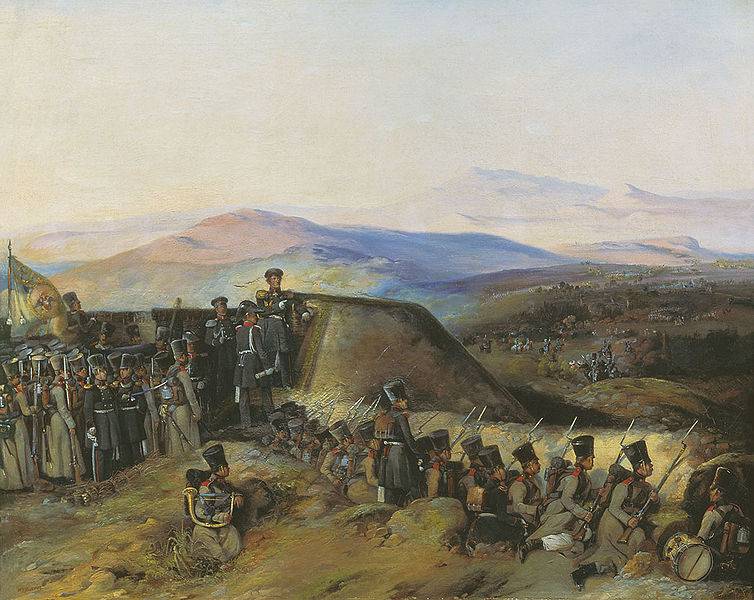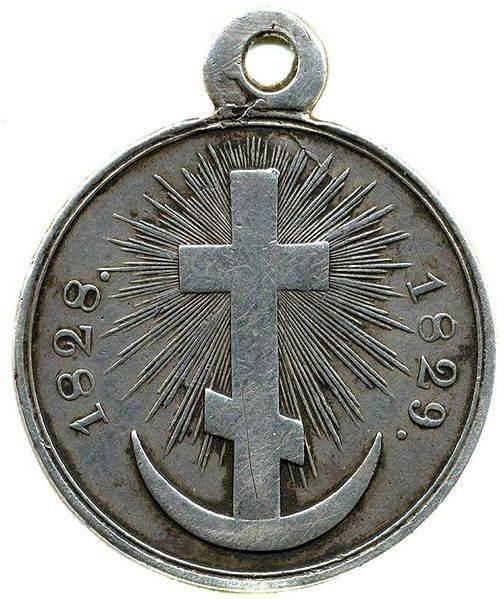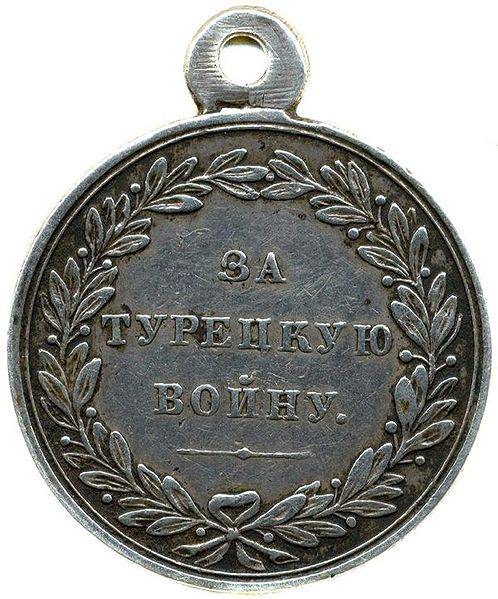Adrianople is ours! Why the Russian army did not take Constantinople

The brilliant march of the Russian army in the Balkans and the victories in the Caucasus did not lead to the same political and diplomatic victory. Russia showed extreme moderation in the negotiations. Petersburg did not use the exceptionally advantageous position created by the efforts of the Russian army and fleet.
Battle at Sliveno
After the capture of Yambol, the army of Dibich was located on the southern slope of the Balkans, on the front from Yambol to Bourgas. The left Russian flank was secured by the domination of the fleet at sea. The Russian fleet strengthened the position of the Russian army on the coast. On July 21 and 23, a Russian landing force landed from ships under the command of Lieutenant Colonel Burko captured the cities of Vasilik and Agatopol. Most of the seaside Bulgaria was under the control of the Russian armed forces.
To protect the rear of the army in the center and on the right flank on the side of Shumla and to communicate with the Danube Bulgaria, Russian troops occupied three passes through the Balkan Mountains. At the end of July, 1829, the Russian army received reinforcements. However, before arriving at the front, the new units suffered such large losses from the epidemic that they slightly reinforced the Zabalkan army. In late July, Dibich in Aidos had about 25 thousand fighters. The rest of the forces were tied up by guards of the rear, occupied by fortresses and monitoring of Shumla.
Dibich, despite the small number of the Russian army for such an operation, decided to develop an offensive against Adrianople, the second capital of the Ottoman Empire. It was the last strong fortress of the Ottomans on the way to Constantinople. The movement to Adrianople was a natural continuation of the Zabalkan campaign. However, before the throw to Adrianople, it was necessary to defeat the Turks at Slivno.
The Turkish command still hoped to stop the Russians from Slivno. The city was well fortified, here is located the corps of Khalil Pasha, reinforced by local troops. He awaited the arrival of the great vizier with reinforcements. The Russian army could not attack Adrianople, while on the flank are significant enemy forces. Dibich decided to preempt the enemy and destroy the corps of Khalil Pasha. He joined the troops of the 6 and 7 corps, reinforced their 5 Infantry Division from the 2 corps, and hurried to Sliven. The battle took place 31 July 1829 of the year. According to our intelligence, the main forces of Khalil Pasha were located in a camp in front of the city on the Yambol road. Dibich directed part of the forces to bypass the main enemy forces in order to capture the city itself and cut the enemy’s escape routes. Another part of the army was rapidly advancing along the road, using artillery and cavalry to wipe out the enemy’s forward detachments. In such a situation, Khalil Pasha had to flee or fight in encirclement.
Russian troops on the right flank bypassed the enemy and reached the city. Here they met opposition from enemy artillery. The Russian commander-in-chief threw an 19 artillery brigade into battle. Russian gunners in the accuracy of fire greatly superior to the enemy, so the Turks quickly abandoned their positions and took the guns to the city. In pursuit of the enemy, the battalions of the 18 Infantry Division broke into Sliven. Khalil Pasha, as expected, threw Imbol fortifications. Turkish troops fled on the still free roads. Russian trophies are 6 banners and 9 guns.
Thus, the attempts of the Turkish command to stop the movement of the Russian army to Adrianople failed. At Aidos, Yambol and Drainno, the Turkish corps were successively defeated and scattered. The Grand Vizier, while in Shumla, weakened his army by isolating individual detachments, losing the ability to take action and communication with Constantinople. The Russian commander-in-chief, Dibich, having secured his rear and right flank, could now safely go to Adrianople. Although he still had few troops.
Adrianople is ours!
Dibich could wait and replenish the army with reserves going to Bulgaria. But, taking into account the fact that the Turkish troops were moving towards Adrianople, and the rapid construction of new fortifications, our commander-in-chief preferred speed and onslaught, according to the precepts of Suvorov. After giving the troops one day of rest, 2 August 1829, Dibich continued the offensive.
Despite the lack of resistance of the enemy, the campaign was difficult. It was hot. Our troops, unaccustomed to such conditions, suffered greatly. The retreating Turkish troops spoiled the wells along the way, bombarded them with animal corpses. Encountered streams are dry from the heat. Diseases mowed down soldiers. As a result, each transition was like a battle - the size of the army was constantly declining. For six days, the troops passed 120 versts and 7 August reached Adrianople. Dibich has only 17 thousand fighters left. Dibich with the chief of staff Tolem left for a reconnaissance, planning the next day to go to the assault on the city. It was a great day. Since the time of Prince Svyatoslav, the Russian squads did not stand at the walls of Adrianople.
Meanwhile, the Turks gathered considerable forces in Adrianople: 10, thousand regular infantry, 1, thousand cavalry, 2, thousand militia. In addition, city walls could protect 15 thousand armed townspeople. The terrain of the city was rugged, which worsened the possibilities of attack, there were old fortifications. The city had many large stone buildings suitable for defense. The Russian army did not have the strength for a complete blockade, and a decisive assault with the powerful resistance of the enemy could end in failure. To delay the siege of Adrianople was dangerous. Russian troops mowed down an epidemic. Sultan Mahmud II called for the protection of Constantinople troops from Macedonia and Albania. To be careful in this situation was impossible, it showed the weakness of the army. Only determination and speed could lead to victory. Assessing the situation, Dibich did everything right. Russian troops prepared for the offensive. The 2 body was in the first line, the 6 body was in the second, the 7 body was in reserve. The Cossacks of the advanced detachment of General Zhirov were taken up by heights around the city. Don Cossack regiment Colonel Ilyin took the road to Constantinople.
The Russian breakthrough through the Balkans, the defeat of the Turkish troops at Aidos and Livny, paralyzed the Ottomans' will to resist. They were stunned and confused. Dibich, without a pause, having started a movement of a small army to Adrianople, frightened the Ottomans even more. They were confident in the strength of the Russians. Such a threat the Ottomans did not know in stories the wars they waged in Europe. Turkish commanders and chiefs were confused, gave conflicting orders, and could not prepare for defense. The troops were paralyzed by apathy, panic began among the townspeople. Already in the evening of August 7, Turkish commanders Khalil Pasha and Ibrahim Pasha offered to discuss the terms of surrender.
Dibich, under the threat of a quick and decisive assault, offered to lay down weapon, surrender all banners, guns, all military property. Under these conditions, the Turks were allowed to leave Adrianople, but not to go to Constantinople (where they could strengthen the local garrison), but in the other direction. The Russian commander gave the Ottomans 14 hours of reflection. On the morning of August 8, Russian troops began to move to Adrianople in two assault columns. The first led Dibich, the second Toll, the reserve was headed by Ridiger. But there was no assault. Turkish commanders agreed to surrender the city on the condition of free passage of troops without weapons. They left in a westerly direction.
Thus, 8 August 1829, the Russian army occupied Adrianople. The Russians got rich trophies - 58 guns, 25 banners and 8 bunches, several thousand guns. Our army got a large number of different supplies and property - Adrianople was one of the rear bases of the Turkish army. The fall of Adrianople made a huge impression not only on Constantinople, but also on Western Europe. In the Turkish capital was a shock and panic. There was a straight road from Adrianople to Constantinople, and the Russians could quickly get to the heart of the Ottoman Empire.
Constantinople at the feet of the Russian army
9 August 1829, the Russian troops resumed movement. The advanced forces advanced to Kirkliss and Lule Burgas, threatening Constantinople. The headquarters of the Russian commander in chief is located with Eski-Saray - the country residence of the Turkish sultans.
Russian emperor Nikolay I subordinated Dibich to the Mediterranean squadron operating in the Eastern Mediterranean. Dibich ordered the commander of the Russian squadron (it consisted of ships of the Baltic Fleet) in the Mediterranean Heyden to begin the blockade of the Dardanelles and act against the Turkish coast. Thus, the supply of food to Constantinople from the southern regions of the Ottoman Empire, especially Egypt, was blocked. At the same time, the Black Sea Fleet under the command of Admiral Greig blocked the Bosphorus. Russian ships intercepted Turkish ships off the coast of Anatolia and Bulgaria. On August 8, the Black Sea sailors captured Iniada, and on August 28, the Media on the Bulgarian coast. In Istanbul, they were very afraid that the Russians would drop troops to capture the fortifications of the Bosphorus. In this case, strong detachments of the Black Sea sailors could support the advance of Dibich’s army against Constantinople.
Even before the capture of Adrianople, Count Dibich ordered General Kiselev, the commander of our troops in Wallachia, to go from defense to offensive. Our troops were to force the Danube on the right flank and a quick march (mainly by cavalry forces) to go over the Bulgarian land to the Balkans, to begin hostilities in the western part of Bulgaria. Such a campaign would have met the support of the Bulgarians, as well as the Zabalkan campaign of Dibich. General Kiselev with the 4-th Reserve Cavalry Corps successfully crossed the Danube, occupied the city of Vratsa and went to the Balkan Mountains. The Russian avant-garde was about to descend from the mountains into the Sofia Valley and free Sofia. However, this march was stopped due to the start of negotiations with the Turkish delegation.
Thus, the Russian army was able to liberate Sofia and all of Bulgaria from Turkish domination. General Kiselev wrote: “My Cossacks were on two marches from Sofia, and in three days I would occupy this wonderful and important city for us ... the Bulgarians would meet us friendly ...”. Kiselev's troops cleared a vast area of scattered Turkish troops. The Russians occupied the towns of the central part of Bulgaria, Lovcha, Pleven and Gabrovo, and the Shipka Pass, which is important for the possible continuation of the war. The remains of the Turkish army remained only in the valley. Maritsa. After the peace was concluded, Russian troops under the command of General Geismar defeated Mustafa Pasha’s detachment (he decided to continue the war on his own) at the Orhaniye pass, still occupied Sofia.
Led by Dibich, the Russian army was on the threshold of the Ottoman capital, the ancient Constantinople of Constantinople. At the same time, Russian troops under the leadership of Paskevich-Erivansky defeated the Ottomans in the Caucasus, took Erzerum. The Turks lost two main armies. Istanbul was without protection. The Ottoman government could not quickly restore the army in the Balkans and in Anatolia. There were no large army reserves to protect the capital. This turn of events in Turkey and Europe did not expect. Russian troops were in 60 kilometers from Constantinople - one Suvorov daily march.
Panic swept Istanbul and European courtyards. From Constantinople to Adrianople and back hurried diplomats and ambassadors. On the very first day of Dibich's stay in Eski-sara, messengers from the British ambassador Gordon, from the French Guillemino, and the Prussian - Mufling arrived to him. All European ambassadors were unanimous - to stop the movement of Russians towards Constantinople and the straits at any cost. Obviously, they understood better than the Russian government the main thousand-year national task of Russia-Russia - to occupy Constantinople and the torrential zone, to make the Black Sea a Russian “lake”.
The Ottoman government, encouraged by such strong diplomatic support, is now in no hurry to negotiate peace. Sultan hoped that France and England would introduce their fleets into the Sea of Marmara and protect the Turkish capital. Dibich, alarmed by the behavior of the Turkish "partners", had already planned to move troops to Constantinople and stand up in visibility from the walls of the city. As the military historian and General A. I. Mikhailovsky-Danilevsky who was then at the headquarters of the Commander-in-Chief, it was easy to take Constantinople — the vanguard of the army’s left column was located at Wiese, and was close to the aqueducts supplying the capital. The flow of water could be stopped, and the city was doomed to surrender as soon as possible. In addition, the army knew that there was no one to defend Constantinople; there would be no resistance. The Russian army was waiting for an order to enter Constantinople — it was reasonable, fair, and deflected the national interests of the Russian people. Mikhailovsky-Danilevsky, the author of the official history of World War 1812, wrote that he had never seen more discouragement than during the days of the depleted troops, when it became clear that there would be no such order.
As a result, Emperor Nicholas I stopped Dibich in Adrianople. In St. Petersburg, feared the collapse of the Ottoman Empire. Seriously believing that "the benefits of preserving the Ottoman Empire in Europe exceed its disadvantages." It was a strategic mistake. At the exit, Russia received the shame of the Crimean War, when the Russians were forbidden to have weapons and a fleet on the Black Sea and the coast, the 1877 - 1878 war. and the performance of Turkey against Russia in the First World War. But they could solve all the issues in favor of Russia with one blow in the 1829 year.
The Russian army could simply enter ancient Constantinople, while Russian squadrons could occupy the Bosphorus and the Dardanelles. The collective West then was not ready to speak out against Russia, following the example of the Crimean campaign. Russia after the victory over Napoleon’s empire was the “European gendarme”, the leading military power of Europe (hence the world). However, the erroneous policy of Alexander I with his Sacred Union, the priority of "stability" and legitimacy in Europe, continued by the government of Nicholas I, the interests of "Western partners" outweighed Russian national interests. The pro-Western vector of St. Petersburg heavy burden spell bound the movement of the Russian hero.


- Alexander Samsonov
- Russian-Turkish war 1828-1829
190 years ago, Russia declared war on Turkey
How the Russian army stormed Kars
The defeat of the Turkish troops in Silistria
Kulevchinskoye battle. How Dibich paved the way for the Russian army through the Balkans
The defeat of the Turkish army in the battle of Kainly
Zabalkan campaign of the Russian army
Information